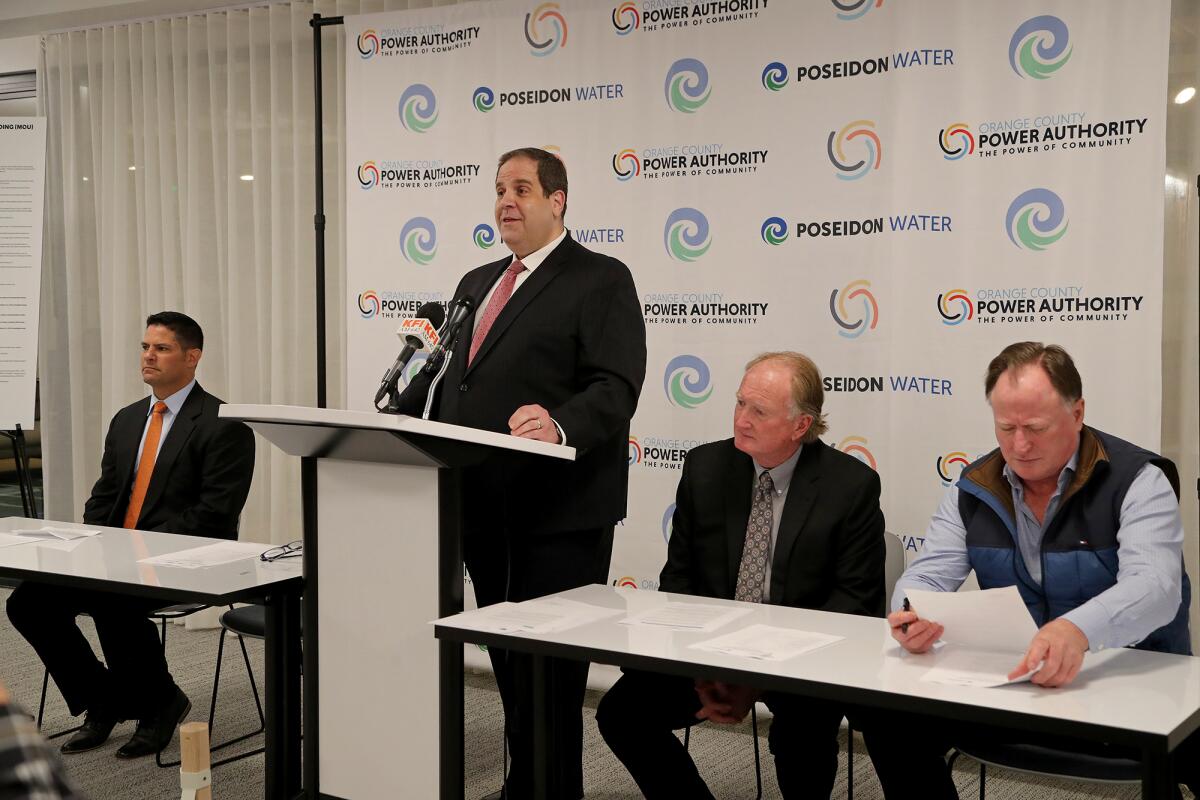State audit recommends improved transparency at embattled Orange County Power Authority

The California state auditor advised that the Orange County Power Authority “increase the transparency of its operations” and raised concerns about some of its past dealings in a report released Tuesday.
It came out hours before Irvine officials considered a motion regarding their participation in the embattled community choice energy program. Officials in Huntington Beach have been exploring the possibility of leaving the clean energy co-op.
“The whole audit reveals a lot of structural concerns that we had before that have now been borne to be true,” said Casey McKeon, the Huntington Beach councilman acting as the city’s representative on OCPA’s board of trustees. “There’s potential financial risk that imposes on the city and its taxpaying residents, and so we want to understand what our options are, whether we stay or leave.”
The goal was for OCPA to be a competitive alternative to Southern California Edison with the mission of encouraging development of green infrastructure in Orange County. The community choice energy program currently supplies power to residents and businesses in Huntington Beach, Irvine, Fullerton and Buena Park.
It had been contracted to serve unincorporated communities of Orange County, but the Board of Supervisors voted to leave the program in December. The county’s departure came after the Orange County Grand Jury had raised questions in June about accountability from OCPA’s leadership, as well as an investigation commissioned by the supervisors that found a large portion of energy customers had opted out of its service.
Projections at the outset of OCPA’s creation predicted that it would be able to absorb the loss of some revenue if it did not meet its goal of 95% participation from potential customers. But those forecasts also described anything at or below 80% as a “worst case scenario,” according to the report issued by California state auditor Tuesday.
As few as 77% of residents in communities participating in the program were getting their power from it, according to auditors.
Most customers who chose to go back to SoCal Edison for service did so within the first weeks of the clean energy alternative’s operation, and since then its customer base has been growing, OCPA Director of Communications Joe Mosca said.
Financially, they are “in the black,” Chief Executive Brian Probolsky said during an interview Tuesday.
None of OCPA’s activities appeared to have violated any laws. However, it has “demonstrated a pattern of contracting practices that were noncompetitive and that reduced accountability by repeatedly circumventing and violating its own policies,” State Auditor Grant Parks wrote in a letter prefacing the report his office published Tuesday.
One series of decisions by OCPA leadership scrutinized in the report involved a contract for marketing and communications services they sought to fill in March 2021. State auditors reported that an initial proposal executives received was split into three contracts, each totaling less than $125,000.
Keeping the value of those deals under that amount allowed OCPA’s chief executive to approve the contracts without seeking approval from its board of directors or going through a formal bidding process, according to the auditor’s report. Over time, two of those three agreements were amended and extended. The final price tag of one came out to about $260,000, and another totaled about $590,000.
Roughly $1.27 million had been paid to the three contractors listed in what had initially been one proposal. OCPA officials renewed all three contracts with them in March 2022 without soliciting bids from competitors, according to the report.
Officials at the green-energy collective were reevaluating those deals, as well as one involving a contract for financial services also mentioned in the the auditor’s report, Mosca said.
“Things like that, those are all concerns right away that just jump off of the page,” McKeon said.
He, Mayor Tony Strickland and other members of the Huntington Beach City Council have voiced interest in leaving the community choice energy program. They are in the middle of “fact finding,” and since December they have been requesting detailed information about the deals OCPA has made with energy suppliers, but have not yet received any, McKeon said.
Huntington Beach and the OCPA had been negotiating the terms of a non-disclosure agreement that will give council members access to unredacted copies of the contracts the energy co-op has entered with providers, McKeon said. That arrangement was finalized and signed about a week ago.
“Until I see that, I don’t know if there’s hope [of reestablishing my confidence in the OCPA],” he said. “Obviously these audit reports are pretty scathing, and you would think they would make changes. There have been minor tweaks around the margins so far, but the concern is that this should never have happened in the first place.”
The auditor’s report pointed out that OCPA has been attempting to hire a power resource director, an internal position responsible for overseeing energy purchases, since May. For now, it works with an outside consulting firm to secure deals with power suppliers. It has entered into over $1 billion in power contracts so far.
Probolsky noted that the firm OCPA works with is the same one that advises other community choice energy programs and that the energy market can be extremely volatile.
The auditor’s report stated that the cost OCPA pays “varies among agreements, sometimes significantly.”
OCPA has made more information available to the public in an effort to increase transparency since concerns were raised by the Grand Jury in its probe in June. Probolsky said his staff plans to submit a plan to address the issues raised in Tuesday’s and past reports at the next meeting of the authority’s board of directors and will be providing updates to the state auditor on a regular basis.
“I think it’s important to note that we’re new, right?” Probolsky said. “And as a new program, we only launched a year ago, we have the critically important mission of climate action and a focus on continued improvement that’s going to allow OCPA to reach our goal of providing businesses and residences a choice in their energy for the first time, ever.”
The net impact generating a portion of OCPA’s energy from renewable sources was equivalent to removing more than 200,000 gas-powered vehicles from the road each year, Probolsky said. He added that before the co-op existed, Southern California Edison had been the only utility delivering electricity to most of Orange County.
McKeon said he understands consumers don’t want a monopoly and he “totally” agrees. “But I don’t know if the government is the best vehicle to create competition.”
Huntington Beach city officials will continue weighing their options, McKeon said.
Meanwhile, officials in Irvine discussed their participation in the community choice energy program during a City Council meeting Tuesday evening. Councilman Larry Agran said that, in his view, OCPA had failed to deliver on its promise of bringing affordable renewable electricity to Orange County.
“I’m disgusted with this whole OCPA saga,” Agran said.
Irvine Councilwoman Kathleen Treseder, one of the city’s two representatives on OCPA’s board of trustees, shared that she would have voted to leave the program as recently as February. However, she pointed out that since then, the green energy collective has replaced its chief legal counsel and taken steps to act on the recommendations of numerous audits.
She said those changes have left her more open to staying on board than she had been just a few weeks ago. She also called for the removal of Probolsky as the OCPA’s chief executive, a move she believes might help rebuild trust in the struggling program.
During the public comment portion of the meeting, some members of the community questioned whether a change in leadership at OCPA would succeed in steering it in the right direction. Others acknowledged the green energy alternative’s launch has been severely flawed, but characterized it as a critical pivot away from the use of fossil fuels.
Councilman Mike Carroll noted that Irvine was largely responsible for putting OCPA together, and it was the only city to invest public funds into it. He expressed concern regarding the county’s recent withdrawal, and the uncertain impact that might have on the other communities who were involved.
“There are millions upon millions upon millions of dollars of power contracts that need to be unwound, all while we have seven and a half million of Irvine taxpayer dollars on the hook.”
Following their discussion and public comments, council members voted on a motion requesting an agreement similar to what OCPA signed with Huntington Beach that would give them access to unredacted copies of power contracts. It also sought to direct city staff to consider downgrading their service from the co-op to provide a smaller amount of renewable energy at a lower rate.
The motion passed with Agran, Carroll, Mayor Farrah Khan and Vice Mayor Tammy Kim voting in support, and Treseder dissenting.
Irvine officials have also commissioned a separate, independent audit of OCPA. The results of that investigation may become available sometime this week, council members said Tuesday.
Updates
2:33 p.m. March 1, 2023: This story has been updated to include observations and comments made during an Irvine City Council meeting regarding that city’s participation in the Orange County Power Authority.
All the latest on Orange County from Orange County.
Get our free TimesOC newsletter.
You may occasionally receive promotional content from the Daily Pilot.




